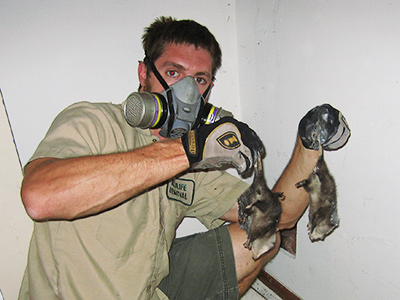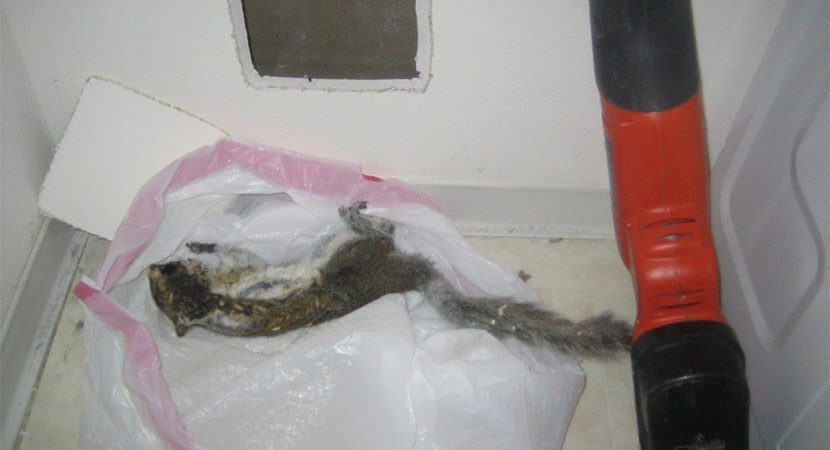Call me: 616-287-6122
Welcome to Grand Rapids Dead Animal Removal! Got a terrible smell in your house, or do you see a dead critter on your property? We are an animal control company specializing in the removal of dead animals from your home, attic, basement, walls, yard, or any part of your property. You clearly don't want a dead animal in your house. Carcasses attract flies and give off terrible smells, not to mention the potential diseases rotting flesh can cause. Whenever we remove dead animals, we use 100% safe methods and make sure to disinfect your home and get rid of all traces of odor. Click here for Free Roadkill Removal and click here for Dead Pet Body Removal. For deceased wild animals in your home or property, call us anytime at 616-287-6122 to schedule an appointment for today! We come out fast! Some of the services we offer include:
- Dead Animal Removal
- Foul Odor Diagnosis
- Full Property Inspections
- House Damage Repairs
- Dead Body Location Services
- Proper Carcass Disposal
- Cleanup & Decontamination Services
- Deodorization Services
CALL US ANYTIME AT 616-287-6122

When wild animals invade our house, they tend to avoid human presence; thus, they will choose the less frequented areas by the homeowners, such as the crawlspaces, basement, and attic. There is also a chance that they may end up dead there. The presence of the carcass in your house and yard can lead to different issues such as contracting diseases and the repugnant scent. For the effective removal of the dead animal, you have us to rely on us. Our services include the proper removal and disposal of the carcass, sanitation and disinfection of the affected area, and neutralizing the odor. Upon the homeowner's request, we can also take care of your dead pet's cremation services. We will give you the opportunity to say a proper goodbye to your beloved pet. We will handle this tricky matter safely. Our people will be equipped with protective gear to ensure that they will remain safe from health hazards. Trust us when you need help to remove animal carcasses from your property. Our technicians are armed with the equipment and tools necessary to sanitarily, safely, and legally dispose of any type of dead animals. Choosing us means doing business with experts that can provide you an immediate solution to your woes.
What Prices Do We Charge?
Learn about dead animal removal costs - each situation is different!
What if you found roadkill or a dead animal such as a deer in a public place, and you want the city or Kent County services to remove it for free? Click here for Free Kent County Dead Animal Removal services. What if a farm animal like a horse, or your beloved pet dog or pet cat has died and you need the body taken away? Click here for Dead Pet Body Removal.
We are experts in dead animal removal, and take our job seriously. When removing dead animals, we do a COMPLETE job — not only do we remove the dead animal from your home or yard, we also decontaminate the area, deodorize it, and dispose of the animal or cremate it. If you aren't sure whether the stench in your house is due to a rotting carcass or another reason, we can sniff it out with our noses from our years of experience. We remove dead raccoons, dead opossums, dead skunks, dead squirrels, dead birds, even dead dogs and cats. We frequently remove dead rodents from inside walls, because poison kills rats and mice, who die in your house. We completely solve your dead animal problem by taking these steps:
- Sniff out the dead animal if it is somewhere in your home
- When necessary, for example if the animal is in a wall or under your house, cut a hole to remove the animal
- Remove the dead animal, safely and completely (and seal the hole if needed)
- Finish the job by decontaminating and deodorizing your home
- Properly dispose of the dead animal through incineration or other means
- Prevent it from happening again by finding out how they got in your house
Dead animal carcass removal is specialty work. Sometimes the job is simple, such as a dead opossum in the yard, in which case we can simply wear our gloves and respirator mask, bag the carcass, and take it away for incineration. Sometimes this is more complex, such as when the dead animal is under a home crawlspace, under a porch or deck or shed. Or if the animal is larger, such as a dog or a deer. The most complex cases are dead animals inside the house. The animal may have died inside the attic, or down in the walls, or the duct work, or any other part of the architecture. You may have a bad smell in your home, and you're not even sure what's causing it. We've removed not just dead animals, but rotting food, bad mold, etc. We specialize in locating the source of the smell, and we very commonly cut a hole in the ceiling or wall to remove the animal. We remove every bit of the carcass, mop up the juices, vacuum the maggots, spray it and wipe it down with disinfectant, cleaner, and we repair the hole we cut. In some cases we use ozone machines to neutralize odor.
Grand Rapids Dead Animal Tip: How long does it take for a dead rat to start smelling, and then stop smelling?

Most people have had to deal with a dead rat infestation problem before. One thing you cannot forget from the experience is the persistent pungent smell that gets on your nerves. You probably turned everything upside down to locate the carcass - and if you were lucky, you did find it. But if you didn’t, you had to endure the smell till it went away.
Once a rat dies, it starts to decompose. During this process, decomposers secrete chemicals that break down the protein in the carcass. The result is the release of gases with a putrid smell. You might be thinking: when does a dead rat begin to smell? When will it stop smelling? Read on to find out the answers.
When Does a Dead Rat Begin to Smell?
Since decomposition starts immediately after a rat dies, the dead rat begins to give off a slightly bad smell. At this stage, you might periodically catch a whiff of foul odor, but you’re more likely to act indifferent, thinking it’s a transient smell.
However, after the next three to five days, the smell becomes malodorous, and the stench would have saturated your entire house. Maggot mass, as well as other decomposers, would have proliferated on the carcass, causing an increase in the production of decomposed chemicals and the overall decomposition rate. At this point, it’s undeniable that you have a dead animal in your house!
It is important to note that other factors also affect the decomposition process. For instance, if the temperature is very cold, the rate of decomposition would be very slow and you might not notice any noisome odor till after a week or more. In hotter temperatures, the carcass may start to stink the same day the rat died.
Other factors that affect when a dead rat would start to smell include the size of the animal, humidity, and the circulation of air, among many others. If you have a dead rat in your ventilation system, then the stench will quickly be circulated to your entire house compared to if the rat died in an isolated room.
When Does a Dead Rat Stop Smelling?
A rat carcass will continue to smell until decomposition is complete. In ideal circumstances, this usually takes between two to three weeks. At this point, the decomposers would have consumed most of the carcass’s flesh, and the bones would have dried up.
Again, several other factors affect how long the carcass will smell. For instance, all other things being equal, a large rat will take longer to decompose than a small mouse. Also, if the moisture level is low, the rate of decomposition slows down. What this means is that the carcass will smell for longer as the decomposition will take a longer time to complete.
Getting Rid of a Dead Rat Smell
The key to eliminating a dead rat smell is to get rid of the dead rat. If you don’t, you’ll have to keep up with the putrid odor until decomposition is complete. Aside from the terrible odor, the polluted air might carry pathogens from the rat’s carcass that might be harmful to humans when inhaled. So it’s important to deal with the problem promptly.
That’s why you shouldn’t ignore any foul odor you notice in your home. Even if you catch a whiff of the smell, make sure you investigate it. And the best way to do that is to follow the smell to where it’s most concentrated - that’s the most likely location of the carcass. If you’re able to locate the spot, but you can’t find the carcass, then the dead rat might be stuck in the wall, ceiling, or under floorboards. You may have to cut through to remove the carcass.
Note that before you come in contact with a dead animal, make sure you stay protected. Put on your hand gloves to prevent direct contact with the bodily fluids of the carcass. Rats and mice spread more than 35 diseases - including leptospirosis, tularemia, hantavirus, salmonella, and more - and they can be transmitted by either handling dead or live rats.
Once you remove the carcass, put it in a plastic bag and throw it away with your trash. You can then decontaminate and deodorize the infected area.
We service nearby towns such as Grand Rapids, Cedar Springs, Rockford, Kentwood, Wyoming, Byron Center, Grandville, Caledonia, Lowell, Sparta, Plainfield charter Township, Kent City, Cascade, East Grand Rapids, Walker, Grand Rapids charter Township, Sand Lake, Comstock Park, Lowell charter Township, Forest Hills, Cutlerville,.